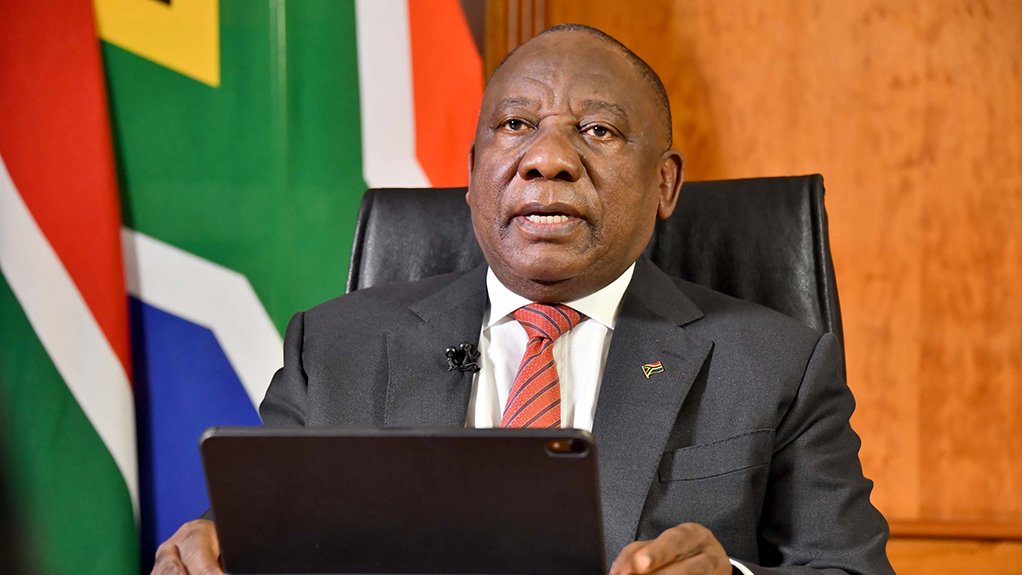President Cyril Ramaphosa announced on Monday night Cabinet’s decision to terminate the National State of Disaster from April 5 since the terms of the Disaster Management Act are no longer met.
Addressing the nation in what has been dubbed the family meeting, Ramaphosa reminded South Africans that the Disaster Management Act provided that certain elements of the regulations may remain in place for a limited period for "post-disaster recovery and rehabilitation".
Recently the Democratic Alliance (DA) threatened to take government to court for failing to terminate the National State of Disaster.
The President said for the past 750 days, South Africa had been in a National State of Disaster, an extraordinary situation that was unprecedented in the country’s history.
He reminded the nation that the declaration of a State of Disaster was a response to a global health crisis that posed a grave threat to the lives and the well-being of South Africans.
“Accordingly, certain transitional provisions will remain in place for a period of 30 days after the termination of the National State of Disaster to ensure essential public health precautions and other necessary services are not interrupted while the new regulations in terms of the National Health Act come into effect," Ramaphosa said.
These transitional measures, which will automatically lapse after 30 days, include mask wearing in an indoor public space, which is necessary to prevent transmission in high-risk places, especially while many people remain unvaccinated.
He said a mask was not required when outdoors.
Secondly, the existing restrictions on gatherings would continue as a transitional measure.
Both indoor and outdoor venues can take up to 50% of their capacity without any maximum limit, provided that proof of vaccination or a negative Covid-19 test, not older than 72 hours, is required for entrance to the venue.
In the event where one fails to produce proof of vaccination or a negative Covid-19 test, then the current upper limit of 1 000 people indoors and 2 000 people outdoors will remain.
Thirdly, the existing provisions with respect to international travel remain in place.
Ramaphosa explained that travellers entering South Africa would be required to show proof of vaccination or a negative PCR test not older than 72 hours.
If they test positive for Covid-19, they will need to isolate for 10 days.
Meanwhile, the special R350 Social Relief of Distress Grant will remain in place, as will the extension of the validity of a learner’s licence, driving licence card, licence disc, professional driving permit and registration of a motor vehicle.
The President reminded South Africans that all other disaster regulations would fall away including regulations on isolation of persons, schools and access to old age homes, public transport, initiation practices, cargo transportation, and criminalisation of non-adherence to these rules.
According to the new changes, Alert levels will no longer apply and the few transitional measures that remain are limited in scope and allow almost all social and economic activity to resume as normal.
“They are essential to reduce the risk of further Covid-19 waves and further disaster. They also ensure that people can continue to receive their special R350 Social Relief of Distress Grant and that there is no interruption regarding drivers’ licences. As I have explained, these are transitional measures which will lapse after 30 days. This will allow the management of the pandemic to be dealt with, as appropriate, by the Health Regulations or other provisions,” he explained.
Ramaphosa also announced that Covid-19 Vaccine Injury No-Fault Compensation Scheme would outlive the National State of Disaster which was brought into force in April last year to provide quick and easy access to compensation to any person who suffered a serious injury as a result of receiving a Covid-19 vaccine.
He said it would only be terminated once it had achieved its purpose.
The President reminded South Africans that the end of the National State of Disaster was an important milestone in the country’s fight against the pandemic.
Ramaphosa called on South Africans to remember those who had lost their lives and the many people who were still struggling with the effects of the disease.
He said it is also a time to pay tribute to the health care workers, police, soldiers, volunteers and other frontline workers for their dedication and service during the worst times of the pandemic.
“The end of the National State of Disaster is a firm statement of our determination to live our lives and rebuild our country even as this virus remains in our midst. It should give all of us the confidence to return to the lives we led before the pandemic, with a few simple adjustments to protect those around us,” he added.
Edited by: Sashnee Moodley
Senior Deputy Editor Polity and Multimedia
EMAIL THIS ARTICLE SAVE THIS ARTICLE
ARTICLE ENQUIRY
To subscribe email subscriptions@creamermedia.co.za or click here
To advertise email advertising@creamermedia.co.za or click here













